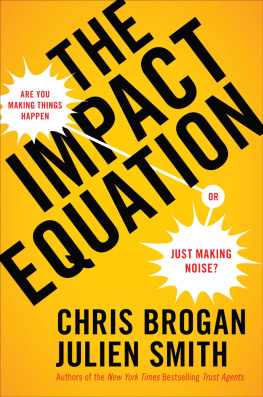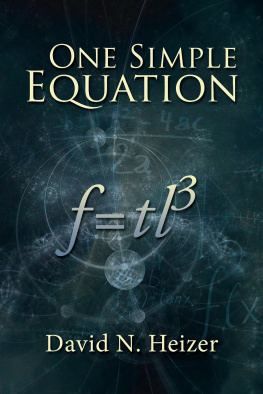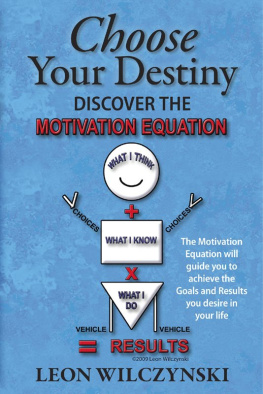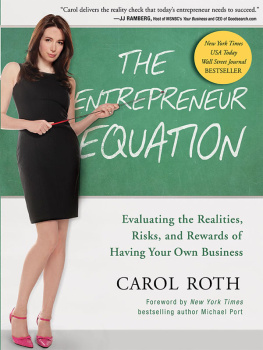THE
IMPACT
EQUATION

THE
IMPACT
EQUATION
Are You Making Things Happen
or Just Making Noise?
Chris Brogan and Julien Smith
Portfolio / Penguin
PORTFOLIO / PENGUIN
Published by the Penguin Group
Penguin Group (USA) Inc., 375 Hudson Street,
New York, New York 10014, U.S.A.
Penguin Group (Canada), 90 Eglinton Avenue East, Suite 700,
Toronto, Ontario, Canada M4P 2Y3
(a division of Pearson Penguin Canada Inc.)
Penguin Books Ltd, 80 Strand, London WC2R 0RL, England
Penguin Ireland, 25 St. Stephens Green, Dublin 2, Ireland
(a division of Penguin Books Ltd)
Penguin Group (Australia), 707 Collins Street, Melbourne,
Victoria 3008 Australia (a division of Pearson Australia Group Pty Ltd)
Penguin Books India Pvt Ltd, 11 Community Centre,
Panchsheel Park, New Delhi 110 017, India
Penguin Group (NZ), 67 Apollo Drive, Rosedale,
Auckland 0632, New Zealand (a division of Pearson New Zealand Ltd)
Penguin Books, Rosebank Office Park, 181 Jan Smuts Avenue,
Parktown North 2193, South Africa
Penguin China, B7 Jaiming Center, 27 East Third Ring Road North,
Chaoyang District, Beijing 100020, China
Penguin Books Ltd, Registered Offices:
80 Strand, London WC2R 0RL, England
First published in 2012 by Portfolio / Penguin,
a member of Penguin Group (USA) Inc.
1 3 5 7 9 10 8 6 4 2
Copyright Christopher Brogan and Julien Smith, 2012
All rights reserved
While the author has made every effort to provide accurate telephone numbers and Internet addresses at the time of publication, neither the publisher nor the author assumes any responsibility for errors, or for changes that occur after publication. Further, publisher does not have any control over and does not assume any responsibility for author or third-party Web sites or their content.
LIBRARY OF CONGRESS CATALOGING-IN-PUBLICATION DATA
Brogan, Chris.
The impact equation : are you making things happen or just making noise? /
Chris Brogan and Julien Smith.
p. cm.
Includes index.
ISBN: 978-1-101-57243-6
1. New products. 2. Creative thinking. 3. Internet marketing.
4. Entrepreneurship. 5. Social media. I. Smith, Julien. II. Title.
HF5415.153.B75 2012
658.872dc23 2012027307
Printed in the United States of America Set in Sabon Designed by
Jaime Putorti
No part of this book may be reproduced, scanned, or distributed in any printed or electronic form without permission. Please do not participate in or encourage piracy of copyrighted materials in violation of the authors rights. Purchase only authorized editions.
ALWAYS LEARNING
PEARSON
To Violette and Harold.
Youre the best thing I was ever a part of, and
I look forward to learning more from you.
Dad
To Helen.
JS
Ceci nest pas un social networking book.
This Book Is About
More Than Social Networks
T he actor James Cagney appeared in well over fifty films, achieving numerous awards, including the Oscar for best actor. The American Film Institute put him in the top ten of its 50 Greatest Screen Legends.
Cagney played tough guys, and if someone tries to imitate him, they will likely sneer, cock their head, and say, Why, you dirty rat! perhaps while erupting into fake machine-gun fire. If youre old enough, you may even remember a reference in Home Alone, the 1990 film starring Macaulay Culkin as an eight-year-old fighting two bumbling burglars trying to enter his home on Christmas Eve. You can probably hear the Cagney sound bite now: Keep the change, you filthy animal.
But heres the thing. Cagney never actually said, Mmmmm, you dirty rat or Why, you dirty rat or even You dirty rat, you killed my brother. Near as anyone can tell, the closest Cagney ever got to the phrase was Come out and take it, you dirty, yellow-bellied rat, or Ill give it to you through the door!
In a way, we feel like Cagney. We dont feel that we focus on how amazing and wonderful social media are, but people often cite us when they talk about social media or list us as authorities on social networks. Well, you dirty rats, read on, because weve got more than that up our sleeve.
You might have picked this book up thinking its about social media. Thats fair. We wrote a New York Times best-selling book that people also thought was about social media and social networks, until they read it. People may say the same about this one.
The Impact Equation is actually about getting a larger audience to see and act upon your ideas and learning how to build a community around that experience to take it all to an even higher level.
When we talk about this, we mention the tools we use to build our platform. Yes, these tools are often social networks. But looking at The Impact Equation as if it were a book about social media is like saying Moby-Dick is a book about boats. The tools do define some of the milieu. We do mention that its much easier to build a platform using social-network tools than it was when one had to rely on the attention of the mainstream media.
But thats not the topic. The topic is impact. This book will explain how to build ideas, how to move them through a platform so they will be seen and discussed, and then build a strong human element around those ideas so people actually know you care about their participation.
It feels a bit strange to continue rehashing this point. Lance Armstrong said, Its not about the bike. No one ever asked Hemingway what kind of typewriter he used to write his storieswell, they probably did, but you see our point.
Were not writing about Twitter and Facebook and Google+ and Pinterest and Path, because who cares? Those things are temporary, and they arent the things that matter. The people are what matters. Are you with us?
PART
Goals
Working with the Impact Equation
T here are two types of people in this world, Brett Rogers said. Youre either a head of lettuce or an apple tree.
Look, if you want to grow lettuce, you plant your seeds, give a little water, and two or three months later you can make yourself a salad. But that lettuce will spoil soon after it reaches maturity, and good luck trying to save it for the winter, let alone find another use for it other than your burger or Caesar salad.
I look at my life and my approach to business as that of the apple tree. It takes about six years for an apple to grow from a seed into an apple-producing tree. Thats a long time even in human years. You have to take care of that tree during those six years too, with no guarantee it will make it to maturity. But you know what? At around the six-year mark, that apple tree starts producing apples, and with a little care and a bit of luck that tree could produce apples for well over a hundred years. And apples keep way better than lettuce. Plus, you can make apple juice, apple cider, apple pie, and all sorts of other foods.
So am I special? No. I just kinda think of myself as an apple farmer, and so I just gotta keep tending the trees until they provide the fruit.
#
Brett Rogers is an adventurer with an amazing story. If you havent heard of him yet, dont worry. Youll be happy you did now.











